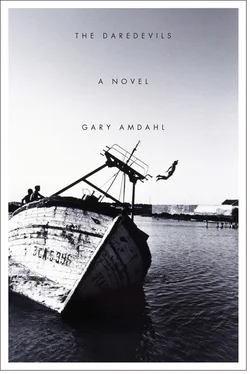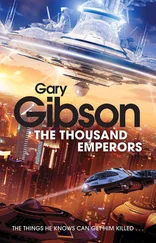Because one of the plays they were rehearsing was Romeo and Juliet (the other two were August Strindberg’s The Spook Sonata and Henry James’s The American ), swordplay had broken out on the stage and in the auditorium. Swordplay often broke out if Charles was even momentarily absent, because actors were like children and directors were like forbidding fathers. Most of the group of fifteen were the legendary friends or friends of friends from Berkeley, if he could be said to have friends, but there was no mistaking it: a father and his children.
With the probable exception of Vera in her grave shroud.
Two duels were taking place, one in exaggeratedly slow motion that seemed Oriental in its precision, the other fast and awkward and accompanied by a great deal of laughter, yelps of pain, and shouted apologies. Five other young men were trying to sort out the fundamental moves of a brawl, made uneasy by Charles’s suggestion via Sir Edwin Carmichael that choreography was the antithesis of violence, that a fight was ugly and embarrassing, and that all attempts to make it a pleasing dance must be in vain. The different son of a different plumber and one of his older brothers were clacking lengths of doweling with each other. Charles, to no one’s surprise, had been schooled in fencing since he was old enough to wave a small toy sword, and was in fact the ensemble’s Romeo, but was concerned that hour with The American and so was armed only with monocle and walking stick. As he watched and breathed and was content — for a moment — to feel the blood pulsing in his extremities, over the din of mock-fighting and outside the theater, he thought he heard more firecrackers going off.
There was a release of light somewhere over his shoulder and a withdrawal of it and a faint clap, followed by the shushing of heavy fabric over the carpeting of the balcony’s center aisle; he could just barely hear it over the voices below. Then came the cloud of smell: stale tobacco and fresh burning leaf, alcohol on the breath and in the cloth, some kind of ammoniac solution, and an alarmingly bracing body odor. This was the theater’s artist in residence, Sir Edwin Carmichael. He was visiting from Verona, where he had his own theater and school of design, named after its principal funder, Lord Howard de Walden. He had acted with Henry Irving and designed sets for Konstantin Stanislavski. He had designed and directed a production of Dido and Aeneas that had almost single-handedly revived interest in the English Baroque composer Henry Purcell — which was where Mother had come in. The man wrapped his cloak more tightly around his frail and trembling body, trapping the stench of himself but allowing the fabric to send eddies and gusts from its folds. He was an artist’s artist and his black, bloodshot eyes were in no way diminished by the shadow of his great slouch hat. He was shivering in the wretched cold of the peninsula’s summer, but all he could think to say to his young hero was that his dinner disagreed with him; he was digesting it poorly — belly inflated like a medicine ball and shooting fireworks at the back of his throat — and could not think straight. His breath was unbearably laden with garlic and deeper evidence of the indigestion, and Charles leaned away. That Sir Edwin could not think straight, and yet was up to admitting it, this was a confusing sign in his experience: too much steam building up in a kind of self-conscious engine already starting to shake and rattle its bolts. Sir Edwin claimed to be a futurist, but Charles was hard pressed to understand what such an identity entailed. More specifically, but even less clearly, he was a vorticist — that was to say, not Italian, but something “like a futurist” from “the vortex of London.” He preferred “found sound” to composed and performed music — but was an acknowledged influence of the Second Viennese School — and was very much in favor of the war: war was “the one great art,” and the only way civilization had to remove the more “festering and stinking of humankind’s many gangrenous limbs.”
Charles and Sir Edwin watched the rehearsal, its director absent but lurking, disintegrate: acrobatic silliness, exaggerated, mask-like mimicry of primary emotional states in ridiculous contexts, and the kind of mincing mock-violence that had actors chasing each other around tables with very small steps, furiously waving their arms and puffing their cheeks out, not knowing what to do once, for instance, one character succeeded in getting his hands around the neck of another character, whom he ostensibly wished to throttle to death. The plumber’s sons broke off their swordplay, and Sir Edwin suggested to Charles that even the children found it all unbearably childish.
“I would rather you tried, all of you, really tried to hurt each other. This waggling of fingers and chasing someone whom you clearly do not want to catch — it’s appalling! Don’t you think so, Charles? I mean, really. It’s insulting unless your audience are children eating birthday cake. You know how to use a sword.” It was true that he was able to fence dramatically well; and while fencers perforce show each other the slenderest profile, Charles often found it possible to drop the point of his foil to the floor and advance, spine straight and shoulders square, one, two, even three long arrogant strides directly into his opponent’s range. “Go down there,” commanded Sir Edwin, “and shove it up someone’s arse, why don’t you.”
“My position, Sir Edwin, is that somersaults and comic faces are delightful.”
“They make me want to vomit.”
“The thought of attempting to wound someone—”
“Yes, but that’s just it! The thought of the attempt — precisely!”
“—to wound a brother or a sister is abominable, maestro.”
“Stop and think a moment while your fluttering little heart becomes a piece of pumping meat again.”
“I find it directly opposed to the nature of the theatrical enterprise.”
“That is not only sentimental horseshit but the foundation of everything that is infantile in the arts.”
“Maestro, this may in fact not be a heaven fit for heroes, but I find I do not much care. I wish only to examine the nature of the real via actions of obscure delight.” Charles had done a great deal of debating in the course of his superb education — and was uncomfortably aware that he did not actually know how he felt. He was uncomfortable as well with his facility in the face of such an absence or ignorance.
“You’re simply naïve,” said Sir Edwin, apparently able to read minds.
“Maybe I am,” Charles admitted.
“You are wrong.”
“Maybe I am.”
“You could not be more wrong. That actors should feel delight at behavior so remote from actuality, from consequentiality, from truth, is almost unforgivably wrong. The urge to wound, to really and truly wound, is the only force that can actually animate lifeless words and weary gestures — the only force, at least, that an audience will sit still for.”
“They seem to be willing to sit through just about anything.” Charles surprised himself with this remark: Was it a truer self at last beginning to emerge?
“Do not confuse desire with pleasure.” Edwin spoke with muted passion.
“I must beg your pardon, maestro. Your meaning is obscure.”
Both of them were acting, not altogether happily, but evidently unwilling or unable to leave off, to break into sincerity and earnestness.
“Do not confuse desire, I tell you, with pleasure .” It was possible Sir Edwin was frustrated, annoyed. His vehemence was pitched uncertainly. He was either in the grip of something, or pretending to be. As he was a drunkard, it would never be certain.
Читать дальше












